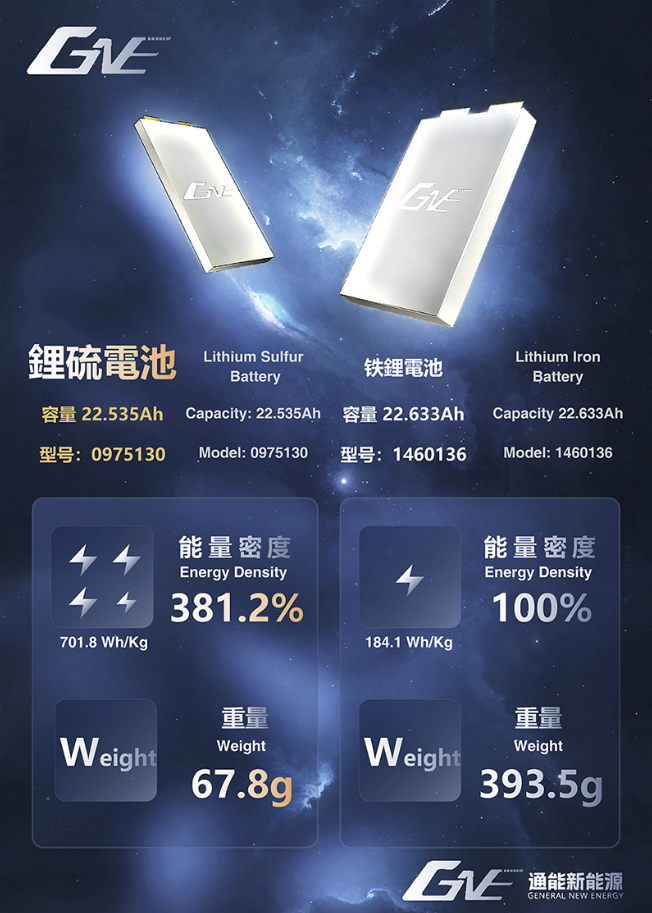R&D
China’s GNE develops lithium-sulfur battery with energy density of 700Wh/kg
The energy density of the newly developed lithium-sulfur prototype far exceeds the one of common lithium -ion batteries.

By
Vincent Shaw
Oct 23, 2024
Products
Products & Services
R&D

Image: GNE
China’s General New Energy (GNE) has recently announced a significant breakthrough in lithium-sulfur (Li-S) battery technology, unveiling a prototype with an energy density of 700Wh/kg.
According to GNE, this new battery not only far exceeds the energy density of existing lithium-ion batteries but also offers substantial improvements in both mileage and safety.
Lithium-sulfur batteries, which use sulfur as the cathode and lithium metal as the anode, represent a promising alternative to traditional lithium-ion batteries. Theoretically, Li-S batteries can achieve energy densities of up to 2,600Wh/kg, which is over five times that of their lithium-ion counterparts. Furthermore, sulfur is abundant, inexpensive, and environmentally friendly, giving Li-S batteries a cost and sustainability edge.
However, Li-S batteries face significant technical challenges. Sulfur’s poor electrical conductivity hinders the battery’s high-rate performance, while the “shuttle effect” of lithium polysulfides dissolving in the electrolyte leads to increased electrolyte viscosity, reduced ion conductivity, and accelerated capacity decay. Furthermore, the considerable density difference between sulfur and lithium sulfide causes volume shrinkage during charge-discharge cycles, compromising structural stability.
The GNE research team, led by Dr. Jiujun Zhang, a fellow of multiple academies including The Academy of Science of the Royal Society of Canada, the Canadian Academy of Engineering (CAE), the Engineering Institute of Canada and the Chinese Academy of Engineering, has been at the forefront of overcoming these hurdles. With more than a decade of persistent effort, Zhang and his team have made many breakthroughs in Li-S battery technology.
By employing innovative designs and materials, they have successfully addressed many of the key technical challenges. For example, the team improved sulfur’s conductivity and ion transport by using nano-material coatings and electrolyte additives, effectively mitigating the shuttle effect. They also developed novel electrolyte materials that improve both the battery’s cycle life and safety. These innovations have laid a strong foundation for the commercialization of Li-S batteries.
Founded in 2022, GNE specializes in developing efficient and eco-friendly energy storage solutions. The company’s R&D team is led by Dr. Zhang, including scientists from the U.S. and Japan. GNE has secured several patents related to Li-S battery technology, covering materials such as cathodes, anodes, separators, and electrolytes.
The company also operates an advanced production line for Li-S batteries and supporting materials, ensuring full control over the entire production process from R&D to manufacturing. GNE has also established a testing team to ensure the quality and performance of its products.
ess-news.com |






